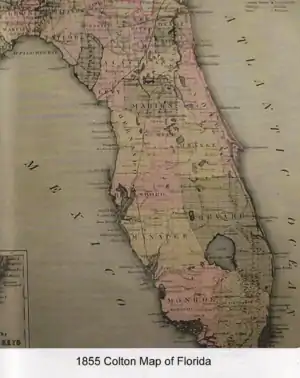St. Lucie County, Florida (1844-1855)
St. Lucie County (also St. Lucia County) is the historic name of a county that existed in Florida from 1844 to 1855, when it was renamed Brevard County. The present county of St. Lucie was founded in 1905 and covers a small part of the same area.
St. Lucie County | |
|---|---|
Former county | |
 Boundaries of Brevard County in 1855, when it was renamed from St. Lucie County | |
| Country | United States |
| State | Florida |
| County seat | Susanna[1] |
| Founded | March 14, 1844[1] |
| Renamed Brevard County | 1855[1] |
After Andrew Jackson received authority to take possession of the Florida Territory, ceded by Spain in 1821, he divided the whole territory into two counties, along the Suwannee River.[1] All of the area west formed Escambia, and all of it east formed St. Johns County.[1] In 1824, St Johns was further divided into Mosquito County. In 1844, Mosquito County was further divided into several counties, including St. Lucie. In 1855, St. Lucie County was renamed Brevard County. However, subsequent changes in boundaries make the present Brevard County contain very little of the original St. Lucie County.
The name "St. Lucie" is originally derived from the name of a settlement near Jupiter Inlet which was founded on St. Lucia's day in 1566. Due to map making and map reading errors, the name later came to be associated with the present day city of St. Lucie, Florida. After "La Florida" and "St. Augustine," it is the oldest place name in the United States.[1]